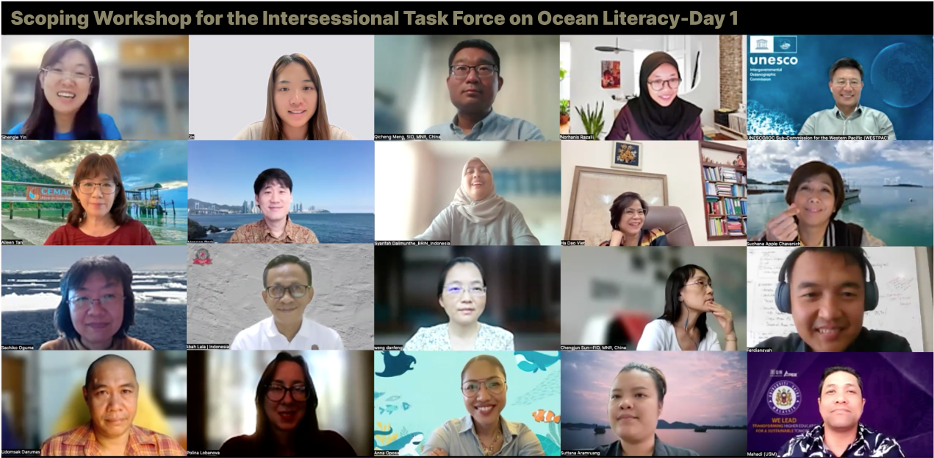- Wenxi Zhu & Shengle Yin
- Posted on
- Bangkok, Thailand
Sharing this vision, the IOC Sub-Commission for the Western Pacific (WESTPAC) convened ocean literacy experts across the region to chart a collective pathway for advancing ocean literacy.
Twenty nominated experts from government agencies, research and educational institutions, and NGOs from 10 Member States-China, Indonesia, Japan, Korea, Malaysia, Russia, Sri Lanka, Thailand, the Philippines, and Vietnam-participated in the Scoping Workshop for the Intersessional Task Force on Ocean Literacy , held online on 9–10 October 2025.
The two half-day sessions, participants engaged in plenary sessions and brainstorming discussions to take stock of existing national policy framework, share ongoing initiatives, and identify challenges and opportunities for promoting Ocean Literacy in the region.

The workshop highlighted a wave of creative ocean literacy initiatives across the region- from Indonesia’s community-based disaster preparedness efforts in South Lebak, to Japan’s Ocean Education Pioneer School programme by the Ocean Policy Research Institute of the Sasakawa Peace Foundation. In Malaysia, Universiti Sains Malaysia’s Coral Camps have inspired young students to care for coral reefs, while China’s Blue Citizen Initiative is fostering citizens better understand the ocean’s vital ecosystem services.
While these initiatives demonstrate strong momentum, experts acknowledged that ocean literacy efforts remain fragmented, and their impact need to be strengthened. Participants underlined the need for synergy, cross-learning, and shared platforms to enhance visibility, exchange good practices, and scale up successful models.
They further emphasized that credible scientific knowledge is fundamental to effective communication and public engagement, and that ocean literacy tools and activities must be tailored to diverse social and economic contexts. In this regard, WESTPAC- building on its long years efforts in advancing ocean knowledge and through its longstanding networks of Member States, and their agencies and institutions- can play a pivotal role in facilitating collaboration and integration across the region.
The workshop concluded with a shared commitment to advance ocean literacy in the Western Pacific through strategic, culturally relevant, and inclusive approaches. All agreed to take further actions by documenting the current status of ocean literacy in Asia- which will also serve as a valuable benchmark for future initiatives, and co-develop region-specific projects to promote and scale up ocean literacy efforts.
For more information about this Scoping Workshop please visit:

